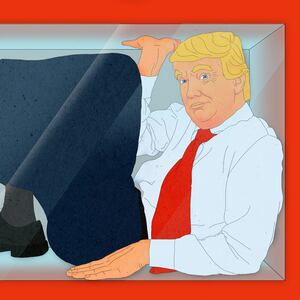President Donald Trump said Wednesday he had pardoned Michael Flynn, his first national security adviser, declaring it a “Great Honor” just in time for Thanksgiving.
“Congratulations to @GenFlynn and his wonderful family, I know you will now have a truly fantastic Thanksgiving!” the outgoing president tweeted.
Trump has reportedly been considering a raft of pardons before he’s booted out of office in January, including pardons for the many people in his inner circle who have committed crimes. Hopeful recipients are going to crazy lengths to lobby for one, according to The New York Times, like imprisoned Tiger King star Joe Exotic, whose team ran up a $10,000 tab at Trump’s Washington hotel in an attempt to get the president’s attention.
Flynn, a retired Army lieutenant general, had served as Trump’s national security adviser for less than a month before things started to go downhill. His tenure was fraught from the beginning: Shortly before leaving office, President Barack Obama reportedly warned Trump, then president-elect, against hiring Flynn. Then, weeks before the inauguration, Flynn reportedly told Trump’s transition team that he was under federal investigation for secretly working as a paid lobbyist for Turkey.
But it was Flynn’s contacts with Russian Ambassador Sergei Kislyak—in which he discussed new sanctions imposed by the Obama administration, among other things— that landed Flynn in legal jeopardy. He pleaded guilty to lying to the FBI about his contacts with Kislyak as part of Special Counsel Robert Mueller’s Russia investigation in 2017.
After initially cooperating with Mueller, Flynn fired his lawyers and reversed course. In summer 2019, he began trying to rescind his guilty plea, claiming he’d been the victim of “Deep State” prosecutors who were out to set him up—a martyrdom narrative that Trump has long amplified. It has made Flynn a hero to the MAGA revenge fantasy known as QAnon, which Flynn, like his now-disgraced attorney Sidney Powell, has appeared to embrace.
And in a move that intensified concerns about Trump using the Justice Department for his personal vendettas, Attorney General William Barr in May moved to drop the charges against Flynn, arguing that he was really just a victim of FBI overreach. The case had been working its way through federal court after Judge Emmet Sullivan, the same judge who told Flynn ahead of sentencing that he “sold out” his country, challenged DOJ’s bid to dismiss charges.
Trump has claimed to have had nothing to do with the Justice Department’s move to drop charges but has heaped praise on Flynn, calling him an “innocent man” and a “warrior.”
Trump also repeatedly teased the idea of pardoning Flynn, boasting in late April that he had a “different type of power” to use if Flynn were not cleared in court.
The move comes as more and more people within Trump’s orbit appear to have come to terms with the fact that he won’t have a second term, even as the president himself refuses to concede.
House Judiciary Chair Adam Schiff (D-CA) said Wednesday that Trump had “abused the pardon power to reward his friends and political allies, and protect those who lie to cover up for him.”
“It's no surprise that Trump would go out just as he came in—crooked to the end,” he said in a statement.
Rep. Jerry Nadler (D-NY) suggested Trump dangled a pardon to get Flynn to backtrack on his pledge to cooperate with the feds.
“And it worked,” he said Wednesday. “This pardon is undeserved, unprincipled, and one more stain on President Trump’s rapidly diminishing legacy.”
It is not unusual for presidents to issue pardons at the end of their terms, but Trump has worried some legal experts with his apparent willingness to grant pardons to his allies and to people his most ardent followers embrace.
Trump has granted pardons to former Arizona sheriff Joe Arpaio, who was convicted of criminal contempt of court for defying a judge’s order to stop racial profiling, and right-wing provocateur Dinesh D'Souza, who had pleaded guilty to campaign finance law violations. He commuted the sentence of Roger Stone, his longtime confidant who was convicted of witness tampering and lying to Congress during the Russia investigation. Following a campaign from some of his favorite Fox News personalities, Trump granted clemency to U.S. service members accused or convicted of war crimes.
Flynn provided an incalculable service to Trump at a time when his first presidential campaign needed it most. As the intelligence chief of the Joint Special Operations Command, and later the Afghanistan war, Flynn fought the war on terror like very few others. United with Trump over their mutual contempt for Islam, which Flynn has called a “malignant cancer,” Flynn gave Trump’s campaign military validation at a time when dozens of senior military and intelligence veterans said Trump was unfit to be president.
Flynn came into Trump’s orbit after their mutual adversary, former Director of National Intelligence James Clapper, fired Flynn from his position atop the Defense Intelligence Agency in 2014. By appointing Flynn as national security adviser, and now by pardoning him, Trump has twice saved Flynn from disgrace.
With additional reporting by Spencer Ackerman








